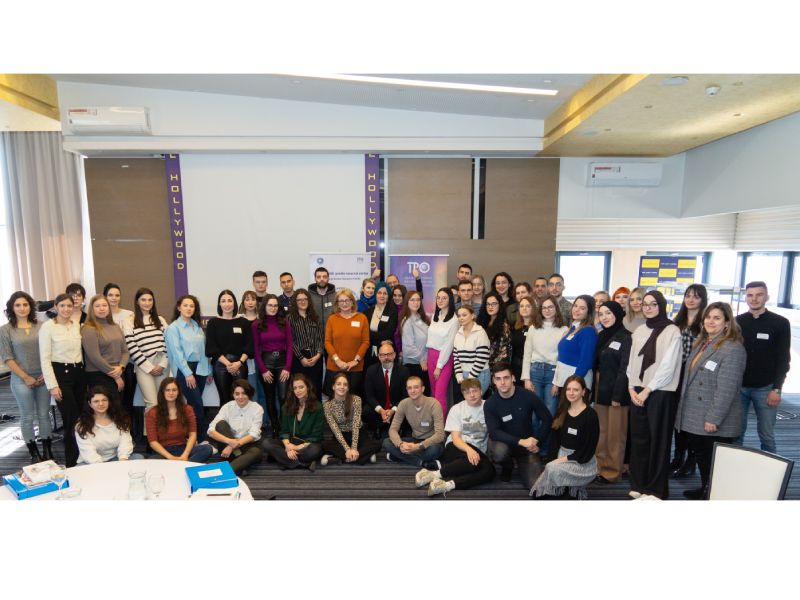The UNIGEM Winter School “Gender and Globalization” has been successfully completed. The winter school was held from February 20 to 26, and has gathered 50 participants from Bosnia and Herzegovina, Croatia, Serbia, and Montenegro. The organizers of the Winter School are the Center for Interdisciplinary Studies – prof. Ph.D. Zdravko Grebo of the University of Sarajevo and the TPO Foundation. The participants of this program were second- and third-year undergraduate and master’s students who come from 19 partner universities from four countries in the region where the UNIGEM project (University and gender-mainstreaming) is being implemented in the period from 2021 to 2025 with the support of the United Kingdom Government.
On 20.02.2023. the program was officially opened with the opening address of the head organizers of the School: Zilka Spahić Šiljak Ph.D., Azra Hadžiahmetović Ph.D., Jasna Kovačević Ph.D., and H.E. Neil Kavangh, Deputy Ambassador of the Government of the United Kingdom in Bosnia and Herzegovina. During the opening address, the importance of regional integration for ensuring a democratic society in which gender equality prevails was highlighted.
“It is obvious that we are not cooperating enough, andnowdazys we need that even more. We have a lot in common, such as culture and language, and there is a good opportunity to create new platforms for joint work through the UNIGEM Winter School, as well as the next schools that will be organized within the UNIGEM project,” pointed out Zilka Spahić Šiljak Ph.D., program director of the TPO Foundation from Sarajevo. Professor Jasna Kovačević Ph.D., from the Faculty of Economics in Sarajevo joined the messages about the importance of joint cooperation, emphasizing that the Winter School was conceived as an intersection of experiences and that this program can be the initial stimulus for regional cooperation on important topics that are represented in our society.
The Winter School program consisted of four areas: Introduction to Gender Issues, Gender and Globalization, Gender and the Economy, and Gender and Migration. Within these four areas, the participants had the opportunity to attend lectures that include 30 hours of classes, 10 exercises, and five hours of study work visits to CIS academic programs of the University of Sarajevo.
During the first day of the Winter School, students gained basic knowledge about the concepts of sex, gender, gender identities, and gender mainstreaming, while using the examples of the Balkan countries. Through tests of implicit bias, they tested themselves and others and thus became aware of their prejudices. At the end of the day, they gained insight into the definitions of masculinity, and through theoretical analysis and deconstruction of prevalent cultural narratives about desirable masculinity and femininity, they also discussed toxic masculinity generated by numerous social factors. Within the second thematic area, political events at the global level and the rise of populist ideologies were analyzed. The Gender and Economy field problematized the oscillations in the global economy from a gender perspective, with reference to the relationship between gender, work, and social reproduction in the global context. In addition, this thematic unit dealt with the management of public revenues through gender-responsive budgeting. The last block of lectures showed how contemporary
global trends, including migration, conspiracy theories, and fake news, influence the radicalization of public space and the emergence of new forms of politically motivated violence.
The activities of the UNIGEM Winter School did not end with the closing of the program. In the following period, the participants of the program have the opportunity to write a final paper, with the help of mentors from partner universities of the UNIGEM project. The selected works of school participants will be published in the collection of works, and the participants who write the paper will receive 3 ECTS points.





















